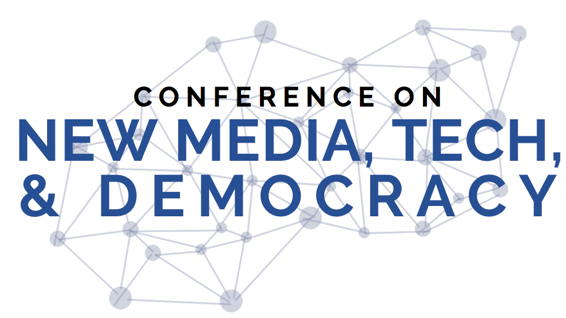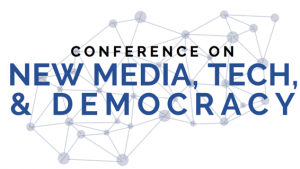
The 2nd Annual Murrow Conference on New Media, Tech & Democracy
Date/Time
Date(s) - 10/07/2020 - 10/09/2020
9:00 am - 5:00 pm
Categories No Categories
 In the midst of the global COVID-19 pandemic and with 2020 elections on the horizon – internet firms, cybersecurity strategists and the press are confronting a new world order. This conference will bring together leading experts for a timely and critical discussion of the shifting landscape of new media, tech policy, politics and democracy in the digital age, and seek to tackle actionable solutions to the unprecedented existential and practical challenges we face today.
In the midst of the global COVID-19 pandemic and with 2020 elections on the horizon – internet firms, cybersecurity strategists and the press are confronting a new world order. This conference will bring together leading experts for a timely and critical discussion of the shifting landscape of new media, tech policy, politics and democracy in the digital age, and seek to tackle actionable solutions to the unprecedented existential and practical challenges we face today.
View all the conference videos here.
Media In Crisis: Reporting In An Era of Fake News & Distrust
Wednesday, October 7th – 9:00 AM ET
Our era of failed leadership and global crises is compounded by an international decline in democracy and the detrimental impacts of COVID-19. In this context, editors and reporters face leaders that spark distrust in the words and motives of some of our longest-standing institutions and are confronted with the ascent of “fake news” as social media platforms become unofficial news publishers. Authoritarian leaders spinning their own narratives through independent channels, alongside threats faced by a free press under political repression, only complicate reporting. This panel will feature the perspectives of a range of distinctive journalists and media experts. The conversation will focus on the challenges that journalists and media organizations face on the front-lines to publish the truth in a rapidly evolving information ecosystem.
Speakers
- Ben Smith: NYT
- Courtney Radsch: Committee to Protect Journalists
Moderator
- TBD
Debating Free Speech: Charting The Gap Between U.S. & EU Online Content Regulation
Thursday, October 8th – 11:00 AM ET
Debate has raged around whether Section 230 of the Communications Decency Act should be amended as Big Tech and regulators grapple with controversial online content moderation practices and their impact on free speech. Trump’s recent Social Media Executive Order highlights how the EU and U.S. are taking radically different approaches to overhaul how platforms should treat user content as they reexamine and update long standing legal protections. The discussion will center around how policymakers should treat user-generated content on these sites – which could consist of hate speech, incite violence or spread disinformation – and what legal ramifications platforms should face with respect to those decisions.
Speakers
- Olivier Sylvain: Professor of law at Fordham University School of Lawand a critic of broad applications of Section 230
- Amelie Heldt: Legal Researcher, Leibniz Institute for Media Research/Humboldt Institute for Internet & Society
Moderator
- Cecilia Kang: NYT
How Our Modern Media Landscape Fueled the COVID-19 Infodemic
Thursday, October 8th – 12:30 PM ET
This panel will explore why COVID-19 conspiracy theories, dubious cures, anti-mask groups and the like took over social media platforms in the wake of the pandemic. From defining an infodemic, to exploring its origins and its subsequent proliferation, this panel will then dive into the response from Big Tech to tackle crucial public health disinformation and recommend how policymakers can better anticipate and prevent this sort of rapid-fire spread, and potentially save countless lives. We will encourage panelists to present specific case studies so the audience can closely follow the journey and progression of posts to better understand why they blossom and how they can better be tamped down.
Speakers
- Herman Wasserman: Professor of Media Studies at the University of Cape Town
- Emily Vraga: Professor of Mass Communication at University of Minnesota
Moderator
- TBD
Biometric Revolution? Election Technology & Digital Democracy in Africa
Friday, October 9th – 11:00 AM ET
Multiple countries in Africa have been attempting to improve the election
process to achieve digital democracy through biometrics with the help of
frameworks and technology developed abroad and locally. How
successful have these efforts been so far and what are the enduring
concerns and threats to democracy, especially during COVID times?
This panel will provide an overview of the legislative, market, and
governance achievements and challenges that some countries have
experienced in the implementation of new biometric election technology.
Speakers
- Marielle Debos: Associate Professor in Political Science, University Paris Nanterre, focus on African biometric market
- Emmanuel Kpalko Brown: Senior Officer, National Identification Authority (NIA) Ministry of Monitoring and Evaluation, Ghana
Moderator
- TBD
2020 Election Security: Combating Digital Threats On The World Stage
Friday, October 9th – 2:00 PM ET
Since the last big election hack, the US has become increasingly more
attuned to and aware of potential foreign interference. This panel will
illuminate which foreign actors may pose a danger to the democratic
process, outline the tactics being used, how they may have advanced
since the last big election hack, and conclude with recommendations to
effectively arm up to combat the latest cybersecurity threats and hacks
that may prevent or dilute the rush to the polls.
Speakers
- Clint Watts: Distinguished Research Fellow, Foreign Policy Research Institute; Non-Resident Fellow at the Alliance for Securing Democracy. Focuses on terrorism, counterterrorism, social media influence and Russian disinformation
- Thomas Parker: Security Studies Lecturer at GWU, seasoned government and intelligence community member with Middle East focus
Moderator
- Professor Josephine Wolff: The Fletcher School
